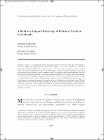Browsing School of Social Sciences and Philosophy by Author "MARSH, MICHAEL ANTHONY"
Now showing items 1-6 of 6
-
A Conservative revolution:: the electoral response to economic crisis in Ireland
MARSH, MICHAEL ANTHONY (2014)The 2011 election in Ireland was one of the most dramatic elections in European postwar history in terms of net electoral volatility. In some respects the election overturned the traditional party system. Yet it was a ... -
Economic voting in a crisis: the Irish election of 2011
MARSH, MICHAEL ANTHONY (2012)The paper explores a question raised by the 2011 Irish election, which saw an almost unprecedented decline in support for a major governing party after an economic collapse that necessitated an ECB/IMF ?bailout?. This seems ... -
Electing the President of the European Commission
GALLAGHER, MICHAEL; MARSH, MICHAEL ANTHONY; Singh, Robert; Tonra, Ben; Laver, Michael (Trinity College Dublin, 1995)This paper is concerned with the legitimacy and accountability of decision-making in the European Union (EU). In the first half of the paper we argue that a straightforward and effective way to improve the legitimacy and ... -
A Relative Impact Ranking of Political Studies in Ireland
MARSH, MICHAEL ANTHONY; BENOIT, KENNETH RICHARD (Economic and Social Studies, 2009)Against a background of the Irish government?s concerns with Key Performance Indicators (KPIs) and the British government?s wishes for a more quantitative Research Assessment Exercise (RAE), our study conducts a relative ... -
Second-Order Effects Plus Pan-European Political Swings: An Analysis of European Parliament Elections Across Time
MARSH, MICHAEL ANTHONY (Elsevier, 2011)After seven waves of European Parliament elections and European Union enlargement to 27 states, the time is ripe to analyse the temporal robustness of the second-order model. We pool all the elections in a single evaluation ... -
Voting for government coalitions in Ireland under Single Transferable Vote
MARSH, MICHAEL ANTHONY (2010)This paper addresses the issue of whether voters indicate a preference for a government rather than, or in addition to a preference for a party, when they cast a ballot under the system of the Single Transferable Vote ...









